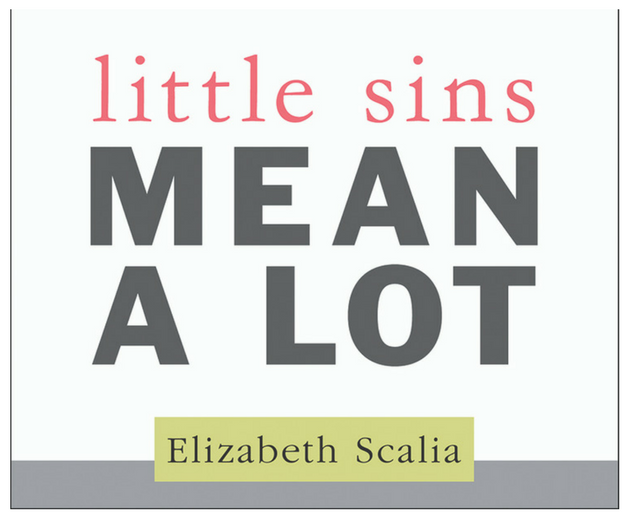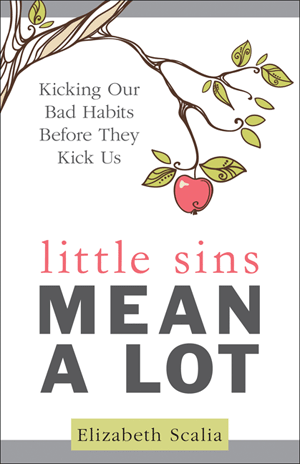Little Sins Mean a Lot: A Book You’ll Dog-Ear and Appreciate

A few nonfiction titles slipped into my summer reading, and they fit as well as the novels. One, in particular, slapped me upside the head like the proverbial two-by-four.
Little Sins Mean a Lot: Kicking Our Bad Habits Before They Kick Us (2016, Our Sunday Visitor) is the second book I’ve read by Elizabeth Scalia, and it was no less mind-shattering for me than the first (Strange Gods, Ave Maria Press).

On an intellectual level, I understand that sin is bad. I get that I’m mired in it and that I should work to get out.
But what about the sins that aren’t a big deal?
How many of us don’t bother with Confession because, hey, we haven’t killed anyone? (My hand’s in the air.)
This book, though, isn’t about Confession. It’s about the things we should be working on that lead us to Confession.
The topics range from the procrastination and gossip to self-neglect and passive aggression. I found myself not only nodding, but thinking long after I was done reading.
Though I don’t intend to procrastinate, Scalia challenged me with how often I do shove things off to another day, another hour, another minute.
I think procrastination is a manifestation of fear that betrays our lack of trust. We believe God has plans for us but still put off doing what it takes to allow the plan to unfold, because we cannot perfectly control the outcome, or control how others will respond to our efforts, or even how we will respond to our own success or failure.
Procrastination, in light of this, becomes more than just having too much on my to-do list.
When we procrastinate, we make excuses about why so many other things need to be done before we can do the thing we’re called to do — the thing we are probably made to do. … It is just so much easier to go do something (or nothing) else, rather than face our fear with Mary’s perfect trust and say, “Behold, I am the hand-servant of the Lord,” and then get cracking.
Guilty as charged.
I was also challenged by Scalia’s exploration of clinging to a narrative. She explains it in a way that hits pretty close to home:
Every story has a narrative thrust, and so do the stories of our lives. We should certainly want to share them, particularly if, in the course of self-revelation, we can manage to be both interesting and throw a little insight into the shared mysteries of life that give us the tumbles. But what stories we choose to share in building that narrative should never become so stuck to us that we are forever defined by them — and when we start acting like life is a perpetual support group, introducing ourselves with our name and our issue, that’s precisely what we do.
Does this mean I shouldn’t make fun of myself quite so much? Well, maybe.
The habit of self-denigration in the name of humility is not really sinful in a usual way of thinking,” Scalia writes. “Self-denigration stops being healthy and starts becoming sinful when it serves to create a despicable or pitiable narrative that we cling to, and eventually allow to utterly ensnare us in characterizations that we can no longer control or amend.
At the end of each chapter’s examination of the little-sin-that’s-really-not, Scalia has compiled a section with excerpts from the Catechism and quotes from saints regarding it.
And then, lest you feel like “Well, that’s it, I’m a hopeless case of X and Z,” she spends at least as much time sharing how to break the habit that the sin has become in our lives.
Best of all, each chapter ends with a prayer, like this one for gloominess or griping:
Lord, we Christians have the image of your cross always before our eyes, and yet we seldom seem to truly take in its lesson. Let the crucifix of Christ Jesus serve to remind us, again and again, that there is nothing we undergo in life — no suffering, no mortification, no burden — that has not been known and shared by him. Help us to remember that we always have before us a choice: to engage with our lives with the common, earthly habit of complaining, and grousing, and the surrendering of hope, or to “offer up,” in prayerful thanksgiving, those things we find to be irksome and difficult, joining them to Christ and the cross, in order to detach from them. In this way, they are also joined to you, in your heavenly kingdom, and we have given some small measure of affirmation and action to our own hopes to reside there with your saints. We ask this through your Son, Christ Jesus. Amen.
This book speaks to my life, as it is and as I struggle within it. It’s a book that looks deep inside and puts all the dust bunnies out in the light.
You can’t help but take a deeper look at yourself and want to change. In fact, thanks to this book, you’ll have the tools and insight to make those changes.
- Keywords:
- books
- elizabeth scalia
- reading
- sins















